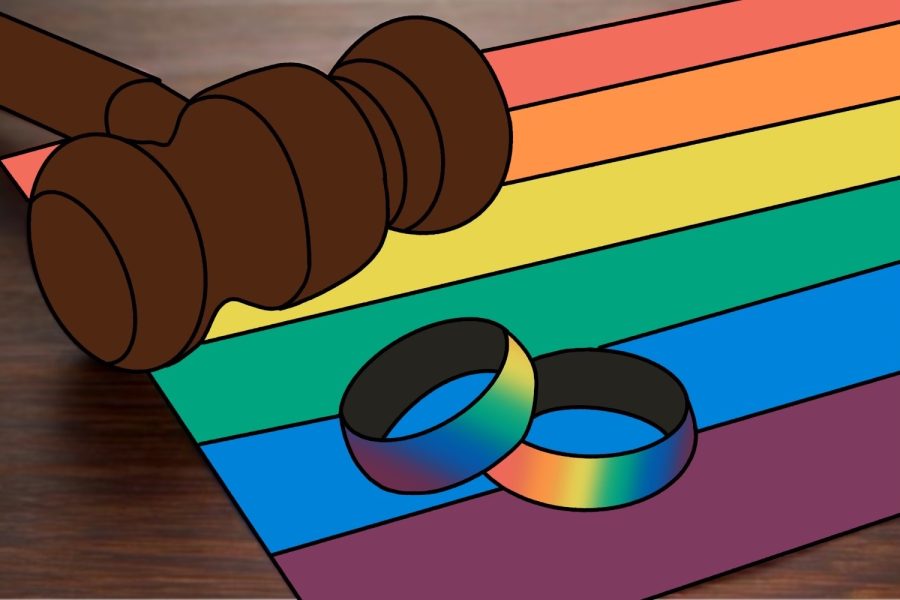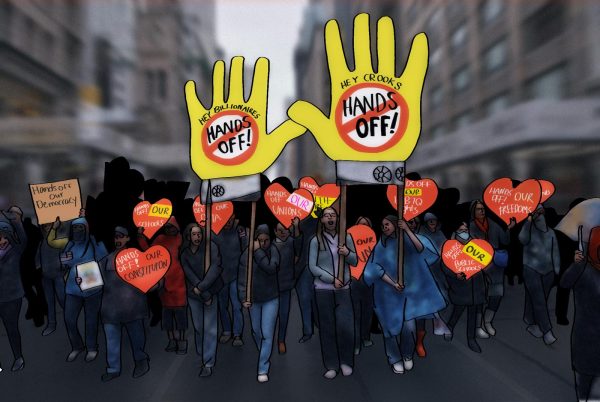LGBTQ+ Landmark: Biden Signs Respect for Marriage Act
The United States government has proved that love truly does conquer all as they continue to protect same-sex marriage.
All over the country, interracial and same-sex couples are sighing with relief as the government is finally officially protecting their marriages and their rights. After the public’s long wait for the approval of their fellow Americans’ basic human rights, Republicans and Democrats put their differences aside to prioritize the importance of love. Although religious concerns arose throughout the bill’s journey, lawmakers followed through on their promise to give legal protection to all marriages, regardless of the people they unite.
On Dec. 13, President Joe Biden signed the Respect for Marriage Act, which secures federal protections for same-sex and interracial couples. Surprisingly, the bill passed with bipartisan support in both the House of Representatives and the Senate.
To truly understand the struggle that has been achieving the approval for the Respect for Marriage Act, it is key to note the ups and downs our former presidents and their administrations have had regarding marriage and LGBTQ+ acceptance.
In an interview on National Broadcasting Company News’ “Meet the Press” in 2012, former Vice President Biden announced that he believed marriage should be about who people love and are loyal to, no matter if they are heterosexual. He affirmed that he thought all of these couples should be entitled to the same rights and civil liberties.
The recent cases of United States v. Windsor (2013) and Obergefell v. Hodges (2015) referred to the Defense of Marriage Act, a federal law stating in its third section that the terms “marriage” and “spouse” legally referred to legal unions between one man and one woman as husband and wife. DOMA was signed into law by President Bill Clinton on Sept. 21, 1996 with Section 2 declaring that states were not required to recognize same-sex marriages performed in another state. Although both Supreme Court cases challenged and successfully gutted DOMA, the law still remains intact, though the House plans to erase it completely.
To be clear, the Respect for Marriage Act specifies that states must recognize same-sex and interracial marriages from any other states and must not prohibit or limit any federal benefits to these couples. It does not imply that the bill will have any impact on religious liberty or conscience.
Discussing an issue that ties into religion, family and governmental aid when writing the Respect for Marriage Act, Congress clearly states that “…millions of people, including interracial and same-sex couples, have entered into marriages and have enjoyed the rights and privileges associated with marriage. Couples joining in marriage deserve to have the dignity, stability, and ongoing protection that marriage affords to families and children.”
Of course, the bill does not restrict any opinions or beliefs of religions that go against homosexuality and interracial marriage and instead puts personal faith aside to give the promised human rights to the citizen couples.
“I think that the approval of the Respect for Marriage Act shows that the government is becoming more independent from the controlling religious beliefs of some of its members, which is only fair to the citizens of the U.S. There is such diversity in this country’s religions; in the end, everyone deserves rights no matter their faith,” freshman Caterina Nuonno said.
In a country full of diversity in religion and opinions, the bill’s purpose and impact on marital laws were challenged by Justice Clarence Thomas. Thomas highlighted the importance of looking back and reconsidering decisions made on the past Supreme court cases that legalized same-sex marriage and protected the accessibility and the rights of marriages to contraception.
However, just as the Supreme Court decision of Roe v. Wade was overturned, Justice Thomas claims the same could happen to this bill. A seemingly silent threat, taking same-sex and interracial couples’ rights back would be taking two steps back after a monumental one forward. If the progress toward equality is challenged by the decision of revisiting and possibly overruling same-sex marriage precedents, even the safety net that is the Respect for Marriage Act will not be enough.
In a statement after the bill’s House passage last week, President Biden said “On this day, Jill and I are thinking of the courageous couples and fiercely committed advocates who have fought for decades to secure nationwide marriage equality at the Supreme Court and in Congress… We must never stop fighting for full equality for L.G.B.T.Q.I.+ Americans and all Americans.”
“Although this bill clearly doesn’t secure safety of the queer and interracial couples in America, it’s refreshing to see the necessary protection given to their rights,” freshman Beatrice Stampino-Strain said.
Having signed for DOMA himself in 1996 as one of the U.S.’s most eminent Catholic politicians, Biden’s actions in signing this legislation show a great initiative to achieve equality and recognition of marital rights for all American citizens, regardless of their race, gender or sexuality.
“Seeing Biden’s actions towards the LGBTQ+ community throughout his history in government is a sign of how times are changing, ideas are evolving and equality is closer than ever before,” freshman Lucia Astorga said.
Your donation will support the student journalists of Coral Gables Senior High School. Your contribution will help us cover our annual website hosting costs.

As a junior in the International Baccalaureate program, Marina Astorga is excited to come back to CavsConnect for her third year. As this year’s Co-Editor-in-Chief,...

Anthony Abrahantes is a senior in the International Baccalaureate program. Born in Miami, Anthony is the middle child in his family. This will be his third...









